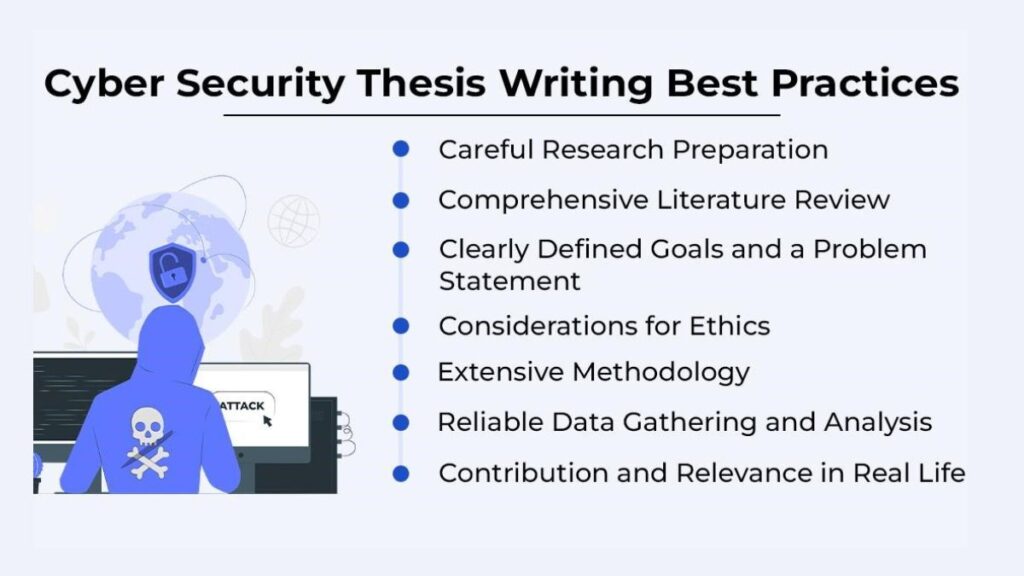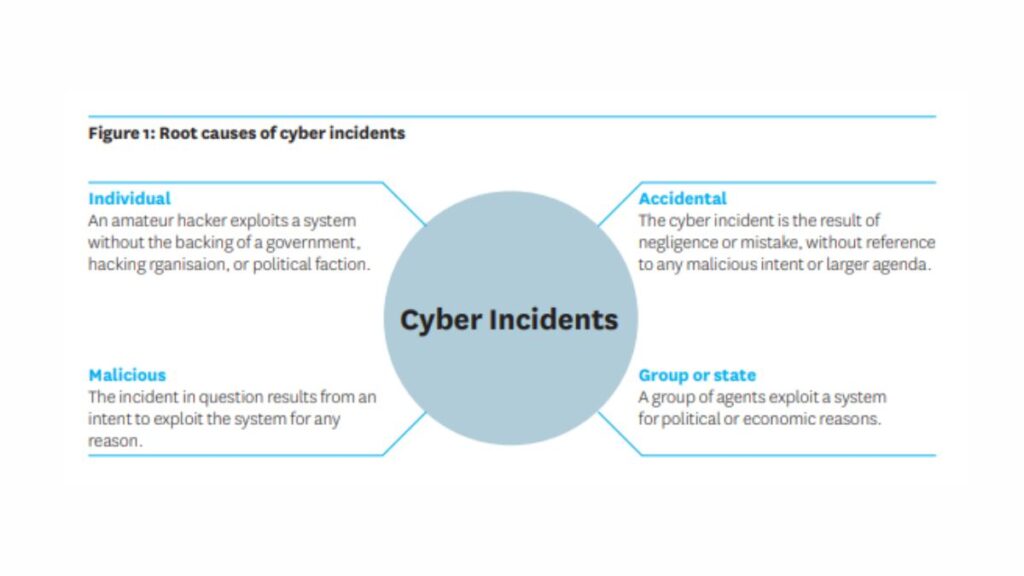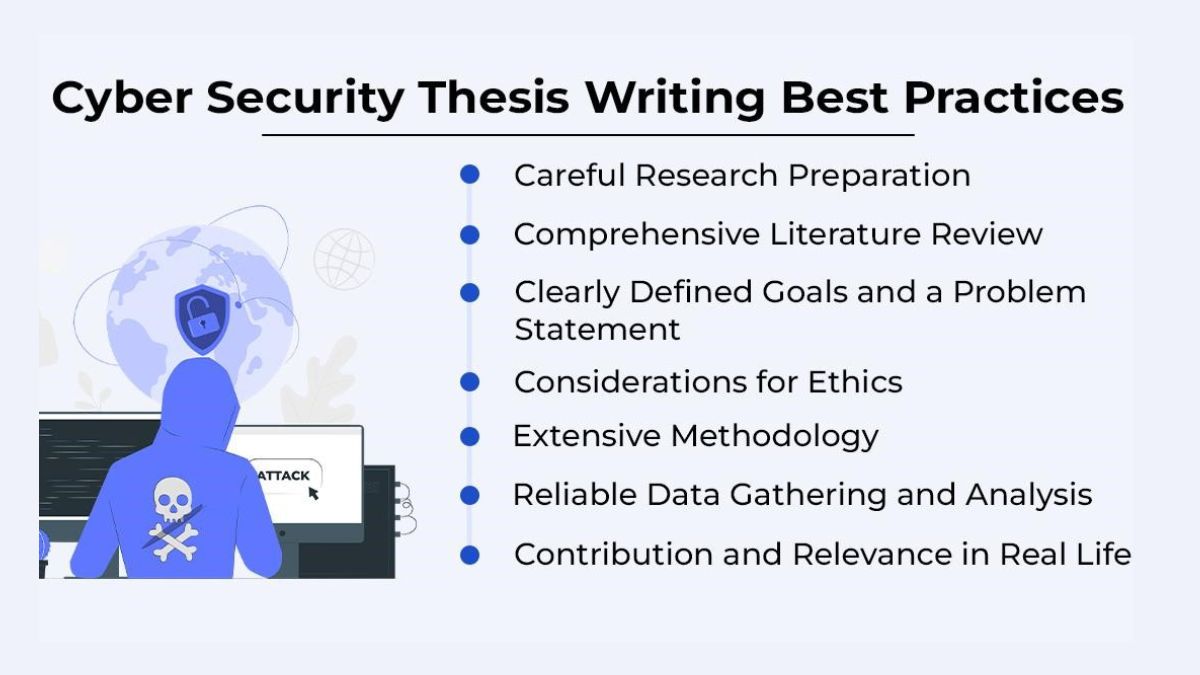Writing a strong cyber security thesis is a difficult task for students as it demands a lot of hard work and research. To start writing a cyber security research paper or dissertation, you must have technical knowledge, good communication and research skills. As the use of technology is increasing, the need for cyber security is also increasing day by day.
According to Gartner, the world is going to spend 11.3% more in 2023 on cyber security and risk management.

But do you know what cyber security is? Cyber is a relevant word used for computers, electronics and information technology, and security means to save something from threat or danger. In this way, cyber security is the practice of protecting electronic devices, networks and data from unauthorised access, hackings, changes or destruction.
“Cyber security is inevitable as cyber breaches are unavoidable in this technical world!!”
Thesis writing on cyber security is valuable in this digital age and plays a great role in the real world with proper development of methods. However, most students find it difficult to write on such a vast subject and to cover all the technical aspects. They can contact thesis writers to get the best thesis help from them.
Here, we will discuss the best practices for writing a cyber security thesis and the pitfalls or mistakes that you must avoid for academic success.
10 Steps to Write a Winning Cyber Security Thesis: Best Practices to Use
Here are some useful steps that you must take to write a winning thesis in cyber security for your academic success.

1. Pick a Current and Relevant Cyber Security Thesis Topic
A strong thesis needs to be built on a solid topic choice. Pick a security research paper topic that follows current business trends and focuses on important issues but also should be according to your interests. Think about the topics like:
- Cryptography
- Malware analysis
- Network security
- Data privacy
- Ethical hacking
2. Conduct a Thorough Literature Survey
Before beginning your research, evaluate the available literature thoroughly to pinpoint any research gaps. Do thorough research to gain a general understanding of the field. You should do this to improve your research questions and prevent reusing already published work.
3. Make Clearly Stated Research Objectives
Clearly state what you want to accomplish with your thesis in your research objectives. These goals will direct the organisation and technique of your research. By setting goals, you will be able to work on the track.
4. Create a Strong Research Approach
Based on your objectives, select the best research approach for your cyber security thesis. Whether conducting empirical research, case studies, surveys, or experiments, make sure the method you choose supports the objectives of your study.
5. Data Collection and Analysis
If your thesis demands any kind of data collection, make sure you follow ethical standards and provide relevant information. Make sure to properly examine the data gathered using the right methods and cyber security tools. The quality of your data analysis determines how accurate your results will be.
6. Formulate a Powerful Thesis Statement
Condense your research’s major point into a single, succinct sentence, which will be called your thesis statement. This sentence should emphasise the importance of your research and the particular issue you are trying to solve.
7. How to Arrange, Format or Structure Your Thesis?
Parts of a winning cyber security thesis:
- An abstract: Shortly describe your research questions with aims and a list of techniques used, and discuss the outcomes of your research.
- Introduction: Describe your subject, give background information, and outline your research goals.
- Literature review: Summarize current studies and pinpoint areas for future study.
- Methodologies: Explain the research strategies you used.
- Results: Outline your research’s conclusions, backed up with statistics and analysis.
- Discussions: Interpret your results, evaluate them against prior research, and describe any ramifications. Provide recommendations for future work.
- Conclusion: Highlight the key findings of your research and provide a summary of your whole cyber security thesis.
- Bibliography: Put a list of references at the end of your thesis to enhance its authority and credibility.
8. Highlight the Practical Implications
The area of cyber security has applications in the actual world. In your thesis, be sure to understand the applications of your research. How can your research help to develop improved cyber security measures?
9. Address Ethical Issues
Research on cyber security sometimes involves sensitive data and ethical problems. Make sure to discuss how you maintained data privacy and adhered to ethical principles in your cyber security thesis.
10. Edit and Proofread
Carefully check for typos, grammatical problems, and consistency issues in your thesis. Proofread your content after taking a rest for some time to check the credibility and transparency of your work.
Pitfalls to Avoid in Cyber security
Cyber security agencies warn users to be cautious while using their technologies to avoid potential security risks. Sometimes, a small mistake leads you to face difficulties and cyber security threats. According to the Imperial College London Institute of Global Health Innovations, the root causes of cyber incidents are the following:

According to the news reported in the World Economic Forum, data from Nozomi Networks stated that security threats have increased tenfold this year, 2023, till now. This cybersecurity threat increased by 96% in malware-related categories like OT and IoT.
Not just this, BlackBerry reported that about 55000 attacks have been carried out from March to May against various government and public sectors. It shows a 40% increase from the previous quarter.
Potential Pitfalls to avoid while writing a cyber security thesis include:
- No proper planning and organisation
- Not choosing the right topic
- Making hurries till the last minute
- Not coming up with a distinctive study angle
- Reviewing very old literature and not surveying the latest trends and updates
- Using the wrong research methodology or failing to adequately explain it.
- Issues with data integrity
- Absence of real-world applications
- The use of jargon-filled language and poorly organised writing
- Not following the basic ethical rules
- Not checking and removing the plagiarism in your thesis
- Not paying attention to editing and proofreading
Conclusion
To make sure that your cyber security thesis will stand out, follow the above best practices and avoid frequent errors. Cyber security is a constantly changing field in which you can be successful by selecting the right topic, doing in-depth research, and adhering to an organised methodology. Remember that a well-written thesis contributes to the advancement of academic knowledge and real-world cyber security solutions.
If you have no idea how to start writing your cyber security thesis, get the best thesis help from The Academic Papers UK.











